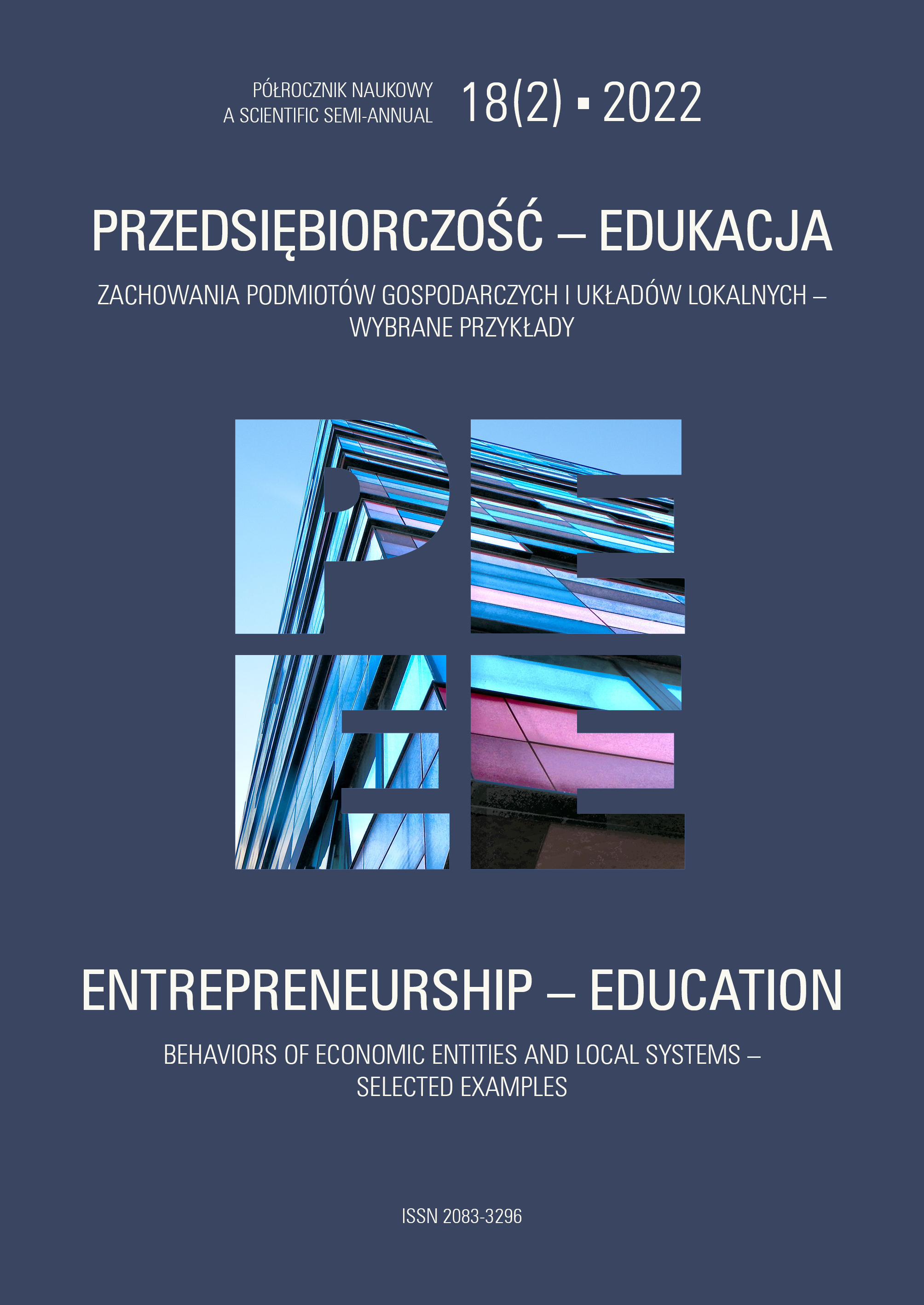Entrepreneurial activities in responding to the crisis caused by the COVID-19 pandemic
DOI:
https://doi.org/10.24917/20833296.182.9Keywords:
crisis, economic policy, entrepreneurship, labour market, unemploymentAbstract
In 2020, the world was unexpectedly struck by the COVID-19 pandemic. The changes that occurred during the pandemic were very wide-ranging. Numerous countries have introduced a number of regulations out of concern for the health and life of citizens. At the same time, the reactions of individual units in response to the pandemic were influenced not only by state regulations related to the use of coercion, but also by individual decisions regarding care for one’s own health. The problems affected many economies, also negatively affecting the labour market. In view of the difficult situation, governments decided to support enterprises in order to keep existing jobs, because the situation of people who provide work depends to a large extent on the entrepreneurs themselves, who, having certain resources, make decisions about their use. The aim of the article is to present the main symptoms of the crisis caused by the coronavirus pandemic and, as a consequence, selected changes that have taken place in the enterprise sector.
References
Al-Omoush, K.S., Simón-Moya, V., Sendra-García, J. (2020). The impact of social capital and collaborative knowledge creation on e-business proactiveness and organizational agility in responding to the COVID-19 crisis. Journal of Innovation & Knowledge, 5(4), 279–288.
Bergami, M., Corsino, M., Daood, A., Giuri, P. (2022). Being resilient for society: evidence from companies that leveraged their resources and capabilities to fight the COVID‐19 crisis. R&D Management, 52(2), 235–254.
Bieńkowska, J. (2013). Psychospołeczne bariery zaspokajania potrzeb pracowników. Diagnozowanie sytuacji pracy. Łódź: Wydawnictwo Uniwersytetu Łódzkiego.
Boone, L., Haugh, D., Pain, N., Salins, V. (2020). Tackling the fallout from COVID-19. W: R. Baldwin, B.W. di Mauro (eds), Economics in the time of COVID-19. London: CEPR Press, 37–44.
Brem, A., Viardot, E., Nylund, P.A. (2021). Implications of the coronavirus (COVID-19) outbreak for innovation: Which technologies will improve our lives?. Technological forecasting and social change, 163, 120451. https://doi.org/10.1016/j.techfore.2020.120451
Casson, M. (2010). Entrepreneurship – theory, networks and history. London: Edward Elgar Publishing.
Ćwikliński, A. (2015). Wybrane aspekty edukacji globalnego świata. W: A. Ćwikliński, M. Przybyła, W.A. Ćwikliński, M. Przybyła (red.), Teorie a implikacje praktyczne. Poznań: Wydawnictwo Naukowe Uniwersytetu im. Adama Mickiewicza, 13–44.
Drucker P. (1992). Innowacja i przedsiębiorczość. Praktyka i zasady. Warszawa: Polskie Wydawnictwo Ekonomiczne.
Dziurski, P., Mierzejewska, W. (2022). Struktura portfela innowacji dużych przedsiębiorstw w Polsce przed globalną pandemią i w czasie jej trwania. Studia i Prace Kolegium Zarządzania i Finansów, 184, 89–100.
Furmanek, W. (2008). Zarys humanistycznej teorii pracy (z perspektywy pedagogiki pracy). Toruń: Wydawnictwo Adam Marszałek.
Grabowska-Powaga, A. (2020). The role of social capital in economic activities in Poland in the period of global crisis. Prace Naukowe Uniwersytetu Ekonomicznego we Wrocławiu, 64(7), 37–45.
GUS. (2020). Aktywność ekonomiczna ludności Polski – II kwartał 2020 r. Warszawa.
Ketchen, Jr, D.J., Craighead, C.W. (2020). Research at the intersection of entrepreneurship, supply chain management, and strategic management: Opportunities highlighted by COVID-19. Journal of Management, 46(8), 1330–1341.
Kwiatkowski, E. (2002). Bezrobocie: podstawy teoretyczne. Warszawa: Wydawnictwo PWN.
Lisowska, R., Ropęga, J. (2016). Współczesna przedsiębiorczość a rozwój małych i średnich firm. Łódź: Wydawnictwo Uniwersytetu Łódzkiego.
López Peláez, A., Erro-Garcés, A., Pinilla García, F.J., Kiriakou, D. (2021). Working in the 21st Century. The Coronavirus Crisis: A Driver of Digitalisation, Teleworking, and Innovation, with Unintended Social Consequences. Information, 12(9), 377.
Łukasiewicz, A. (2022). Konsekwencje ograniczeń związanych z pandemią COVID-19 dla transportu pasażerskiego. Studia BAS, (1), 85–108.
Markiewicz, R. (2019). Kryzys w kryzysie. Psychologiczny wymiar pandemii. Polish Journal of Public Health, 129(4), 138–140.
Marshall, A. (1925). Zasady ekonomiki. Warszawa: Wydawnictwo M. Arcta.
OECD. (2020). OECD Employment Outlook 2020: Worker Security and the COVID-19 Crisis. Paris: OECD Publishing.
Oleszczyk, A. (2022). Szanse młodych na „covidowym” rynku pracy. W: K. Białożyt-Wielonek (red.), Wybrane aspekty funkcjonowania rynku pracy w czasie pandemii COVID-19. Kraków: Wydawnictwo Scriptum, 91–112.
Pawłowski, A. (2020). Covid-19, Environmental Engineering and the End of the World as We Know it. Problemy Ekorozwoju, 15(2), 7–14.
Płonka, M., Skurska, E., Staszkiewicz, A. (2021). Zmiany na rynku pracy w pierwszym roku po rozpoczęciu pandemii COVID-19 w Polsce. W: E. Sobczak (red.), Współczesne trendy w gospodarce. Wrocław: Wydawnictwo Uniwersytetu Ekonomicznego we Wrocławiu, 27–37.
Say, J.B. (1960). Traktat o ekonomii politycznej. Kraków–Warszawa: Wydawnictwo PWN.
Schumpeter, J.A. (1991). The Economics and Sociology of Capitalism, Princeton: Princeton University Press.
Shehzad, K., Xiaoxing, L., Kazouz, H. (2020). COVID-19’s disasters are perilous than Global Financial Crisis: A rumor or fact?. Finance Research Letters, 36, 101669. https://doi.org.10.1016/j.frl.2020.101669
Smith, A. (1954). Badania nad naturą i przyczynami bogactwa narodów. Warszawa: Wydawnictwo PWN.
Stradomski, M., Schmidt, K. (2020). Secular stagnation and COVID-19. Prace Naukowe Uniwersytetu Ekonomicznego we Wrocławiu, 64(4), 199–212.
Turoń, K., Kubik, A. (2021). Business innovations in the new mobility market during the COVID-19 with the possibility of open business model innovation. Journal of Open Innovation: Technology, Market, and Complexity, 7(3).
Zahra, S.A. (2021). International entrepreneurship in the post Covid world. Journal of World Business, 56(1). https://doi.org/10.1016/j.jwb.2020.101143
Zioło, Z. (2013). Uwarunkowania rozwoju przedsiębiorczości w warunkach kryzysu gospodarczego. Przedsiębiorczość – Edukacja, 9, 10–33.
Downloads
Published
How to Cite
Issue
Section
License
Copyright (c) 2022 Entrepreneurship – Education

This work is licensed under a Creative Commons Attribution-NoDerivatives 4.0 International License.
Articles are published under the terms of the Creative Commons License (CC BY-ND 4.0; Attribution– NoDerivs).

